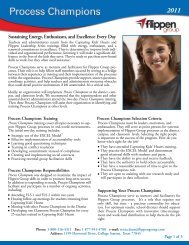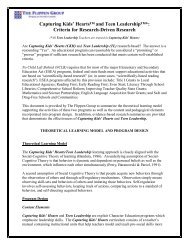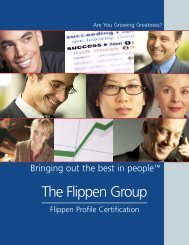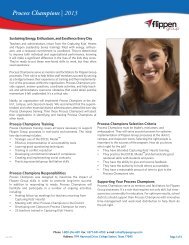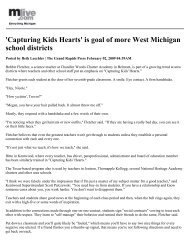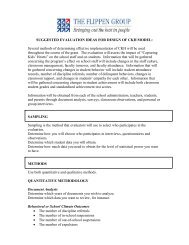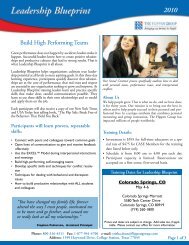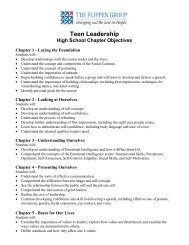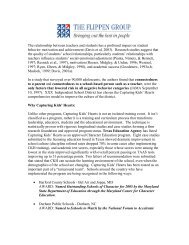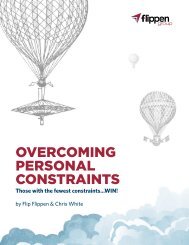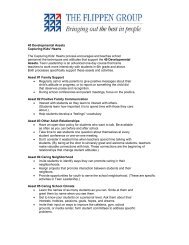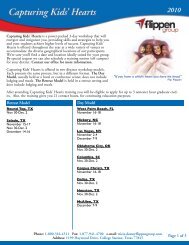Smart & Good High Schools - The Flippen Group
Smart & Good High Schools - The Flippen Group
Smart & Good High Schools - The Flippen Group
- No tags were found...
You also want an ePaper? Increase the reach of your titles
YUMPU automatically turns print PDFs into web optimized ePapers that Google loves.
CHAPTER 5: Fostering the 8 Strengths of Character—Outcome 5peaked in the 18th-century works of Edward Gibbon andDavid Hume. From the perspective of these historians, historyis a branch of moral philosophy, and its lessons serveas guidelines for prudent thinking and moral behavior. [History]can help members of the general public think criticallyabout social and political issues and to reflect on theirmoral values and behavior.This broader definition of history has particular attraction toadolescents. Such students are likely to be struggling withissues of trust, loyalty, and responsibility as individuals withingroups. <strong>The</strong>y are beginning to see themselves as uniqueindividuals who are, at the same time, desperately needingto belong. In their [social studies] curriculum, they need toengage in moral reasoning in order to become aware oftheir own development. 14Facing History students showedimproved moral reasoning andreduced racist attitudes.A Harvard University evaluation of Facing History and Ourselvesreported:Students’ moral reasoning scores significantly increased. Programstudents showed increased relationship maturity,decreased fighting, and reduced racist attitudes. 15Facing History students also keep journals during the eightweeks of the unit. <strong>The</strong>ir entries reflect the curriculum’simpact on their character. One girl wrote:I’m glad this unit was taught to us, and especially to me.At the beginning, I have to admit I was prejudiced againstJews and was glad they were killed. I know this is awful,especially if that is your religion. <strong>The</strong>n you and the classdiscussions proved to me I was wrong. Jewish is just like meand other people.Teachers testify that years after the Facing History unit, studentscome back and say that it changed them as persons.Some students, after examining prejudice in their ownlives, wanted to know what they could do to help preventprejudice and improve society.That led Facing History creators to design a curriculumsequel, Choosing to Participate, that not only examinesmoral agency in history but challenges students to developtheir own moral agency by getting involved. <strong>The</strong> curriculumexamines all the ways that people historicallyhave participated—through human service, politics, socialactivism, and other voluntary activity—in creating a societythat seeks justice and dignity for all its members.We visited one award-winning high school in which allfreshmen take a year-long course that combines FacingHistory, Choosing to Participate, and a service-learning experiencethat requires students to plan and carry out asocial action project in their school or community.<strong>The</strong> Giraffe ProjectFor the past two decades, examples of moral courage andcompassion have come in abundance from the Langley,Washington-based Giraffe Project (www.giraffe.org). Thisproject is dedicated to finding and honoring “humangiraffes”—people sticking out their necks for the commongood.Co-directors Ann Medlock and John Graham have createda character education curriculum around these everydayheroes. Students read giraffe stories, find and tell storiesabout giraffes in their own school or community, andthen are challenged to become giraffes themselves bysticking their necks out to make a difference. SampleGiraffe stories:Julie Leirich is a checkout clerk in a Los Angeles supermarket.She saw that the market threw away a lot of goodfood—and that there were a lot of hungry people on thestreets. She stuck out her neck and started taking that foodto the homeless. When she admitted what she was doing,her boss didn’t fire her—he gave her more food. Customerswho heard about Julie’s efforts volunteered to help. TodayJulie and her fellow volunteers distribute six tons of food amonth to the hungry and homeless in Los Angeles.British doctor Alice Stewart has quietly done a lifetime ofpainstaking research on the effects of radiation. One of hermany discoveries was that a single X-ray of a fetus coulddouble the risk of childhood cancer. She has ruffled a lot fofeathers in medicine and industry, but thanks to her, thousandsof children’s lives have been spared. She continues herresearch on public health hazards. 16Over the past 20 years, the Giraffe Project has built abank of more than a thousand stories of giraffes of allages. See www.giraffe.org.You must do the thing you think youcannot do.—ELEANOR ROOSEVELT157<strong>Smart</strong> & <strong>Good</strong> <strong>High</strong> <strong>Schools</strong>



